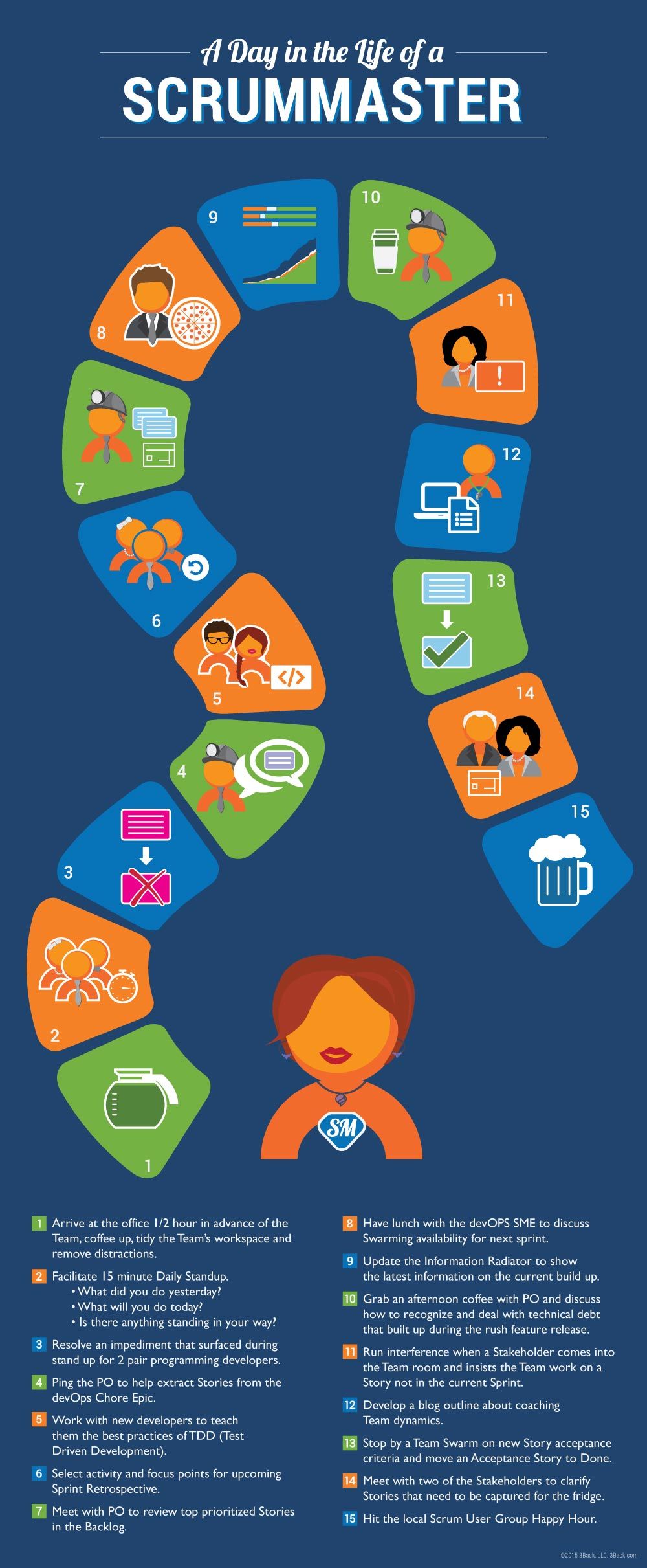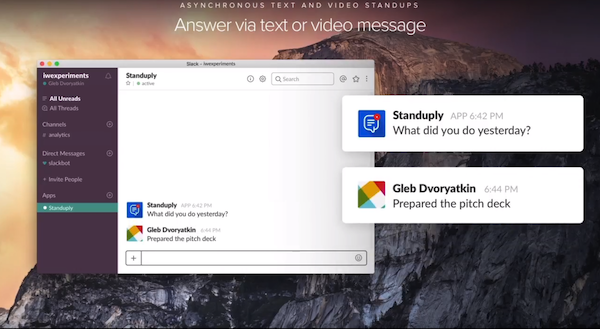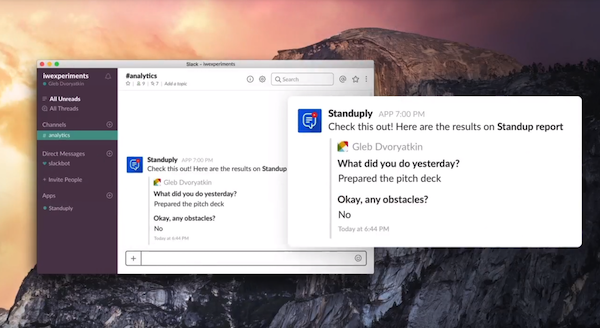Looking to hire a Scrum Master?
Interviewing candidates is no easy task because Scrum Master responsibilities go far beyond the Scrum processes set up. When you embed real-world situations in the Scrum Master interview questions, the hiring process becomes more efficient.
A Scrum Master not only knows Agile and Scrum in and out. She can react proactively to solve complex situations and has essential attributes to look for.
An experienced Scrum Master can make a huge difference in the dynamics and performance of an Agile team. However, with the broader Scrum adoption, there are some poorly trained specialists out there who do not fully understand Scrum.
Hire one of those and chances are your team will be demotivated and reject Scrum.
“Сhoose a Scrum Master during the interview using questions about real-world situations.”
 Artem Borodin, CSP-SM, Scrum Alliance Certified, PMP.
Artem Borodin, CSP-SM, Scrum Alliance Certified, PMP.
Artem works on Standuply, a Slack bot that automates Scrum processes. Hire Standuply to save time for your Scrum Master. Together with Artem, we prepared this Interview Guide that consists of three parts:
Together with Artem, we prepared this Interview Guide that consists of three parts:
I. 12 Questions about Real-World Situations.
II. 10 Questions on Culture Fit.
III. 90 Questions on Agile/Scrum expertise.
. . .
Do you want to ask for Artem’s advice? Here’s his profile at Standuply Mentors, reach out directly to me for any help you may need.
. . .
When hiring a Scrum Master, the great practice is to discuss real-world situations. Ask behavioral interview questions to a candidate to assess how she would think and act in a case that may appear at your workplace.
A part of the interview on culture fit is also essential. It helps with understanding the alignment of your company and the candidate’s goals and vision.
And of course, you’d want to make sure a candidate understands Agile principles and Scrum ceremonies and artifacts. You’ll find a broad set of questions for that purpose below.
Scrum Master Interview Questions – Part I
Situational questions are an essential part of the interview process in assessing candidates who will be a good fit for an open Scrum Master job. Here are 12 real-world situations to discuss during an interview.
Dive deeper into the discussion of each situation when possible asking open questions like “why would you do that?”, “what is your desired outcome?”, “what if nothing changes?”, etc.
Questions about Real-World Situations

1. You have been just hired as a new Scrum Master. The team you’re going to work with doesn’t have any experience in Agile and is very skeptic about Scrum. They want to focus only on coding and don’t want to track their progress or attend any meetings. How do you influence and motivate them to use Scrum?
2. Product Owner doesn’t have any experience in Agile methodologies. He used to manage Waterfall projects. He doesn’t want to participate actively in Scrum events like Sprint Planning, and Sprint Review and be available for Dev Team during Sprints. What would you do to make sure the Scrum process is being applied?
3. You already performed Scrum training for stakeholders. After an initial phase of trying to apply the concepts, when first obstacles/hurdles are encountered, you see that these colleagues build serious resistance in continuing with Scrum adoption. What is your strategy/experience to handle such situations?
4. The Product owner of your Scrum team tends to add ideas of all kind to the backlog to continue working on them at a later stage. Over time, this has lead to over 200 tickets in various stages. What is your take on that: Can the Scrum team work on 200 tickets?
5. Your Dev Team works on a very legacy software project. Unfortunately, the team was set-up recently and don’t have appropriate knowledge about the old platform. So far, all Sprints have finished with very low velocity and without significant results. What would you do to help the team achieve success?
6. A user story is lacking the final designs, but the design department promises to deliver on day #2 of the upcoming sprint. The product owner of your Scrum team is fine with that and pushed to have the user story in the sprint backlog. What is your take?
7. The Product owner of your team normally turns stakeholder requirement documents into tickets and asks to estimate them. Are you okay with that procedure?
8. The project is delayed three months/has lots of dependencies/based on old technology. Do you find this appealing/challenging for you? Have you worked in the similar situation?
9. In case you receive a story on the last day of the sprint to test, and you find there are defects, what will you do? Will you mark the story to done?
10. A team is always picking reasonable action items but is later not delivering on them. How do you handle this habit?
11. The product owner chooses new features regularly and never picks bug fixes. In the end, the crashes have to be fixed, and the tech debt is growing. Those problems are slowing down testing and development. What would you do in short and in the mid-term?
12. Your team approaches major release deadline and, as a result of the mid-iteration assessment, you realize that due to internal team reasons, release deadline has to be shifted significantly and this impacts marketing and other operational activities by the client which depend on product release date. Please write an email notification to clients explaining the situation and your next steps.
Scrum Master Interview Questions – Part II
Knowledge and experience don’t matter if there is no culture fit. This part is focused on questions to reveal whether a candidate is a perfect fit for your team.
When your Scrum Master is a great fit, her working day is productive, full of positive communications and goes like this.

Questions on Culture Fit
1. Why did you decide to apply for this job?
2. What would you do during your first month if you were hired by our company?
3. What kind of project would you like to work on?
4. Describe your perfect company/organization culture.
5. What are your strengths and beliefs?
6. How would your Dev Team members describe you?
7. How do you maintain a good working relationship with Dev Team members?
8. What type of personality types did your team have?
9. Did you have a chance to work with international teams?
10. How do you handle conflict situations? Provide examples.
In addition to these questions, here’s a podcast to learn from. It talks about signs of a good Scrum Master and the interview process on how to choose the right candidate. All those questions are eligible for remote interviews, and if you use video interview software, you can easily handle the process without pressure.
Scrum Master Interview Questions – Part III
This part contains all sorts of theoretical and practical questions to check whether a candidate holds Scrum Master certification for its sake or has a deep understanding of Agile and Scrum processes.
Introduction to Scrum

First, let’s walk a candidate through Agile and Scrum Framework. The goal is to spot the Agile mindset and the knowledge of the Scrum Framework in general.
This part should also be focused on implementation Scrum and communicating it to stakeholders and team members. If done wrong, a transition to Scrum may fall apart.
Theory questions:
1. Explain Agile in 2 minutes? When should you use Agile?
2. What is the Scrum process? How is Scrum different from Waterfall?
3. What is the role of Scrum Master, Product Owner and Scrum Team in the Scrum process?
4. What kind of Agile frameworks besides Scrum do you know?
5. What are the artifacts in Scrum? What are the Scrum ceremonies?
6. How do you understand ‘Self-organizing’ concept in Scrum?
7. Where does automation fit into Scrum?
8. Shall the Scrum team become involved in the product discovery process, and if so, how?
9. What do you recommend a newly formed Scrum team works on first? What is sprint Zero?
10. What are the characteristics of a good Scrum team? How do you as a Scrum Master facilitate that?
11. How do you measure the maturity of the Scrum process?
Practical questions:
1. How do you introduce Scrum to senior executives?
2. How do you ensure that the Scrum team has access to the stakeholders?
3. How do you spread an Agile mindset in the company across different departments and what is your strategy to coach these non-IT stakeholders?
4. How would you prepare to kick-off transitioning to Scrum? How would you create the first Scrum team?
5. What kind of information would you require from the Product owner to provide the team with an update on the product and market situation?
6. How do you manage risks in Scrum projects?
Product Backlog Refinement and Estimations

As the next step, let’s dive deeper into Scrum ceremonies and artifacts. We’ll divide those into several separate parts to talk about.
Starting with the Product Backlog and estimations interviewer will get an understanding of candidate’s core Scrum background.
Theory questions:
1. What is a Product Backlog? Who is in charge of filling it up?
2. What is a User Story?
3. Who should be writing User Stories? What is the best practice for writing User Stories?
4. What are Epics? Provide examples.
5. List techniques for prioritizing User Stories.
6. What is “Definition of Done” and “Definition of Ready? How is this achieved?
7. What is the best practice for creating DoD, DoR?
8. What is a Story Point? How do you calculate that?
9. Why aren’t User Stories usually estimated in working hours?
10. What is Backlog grooming? How often does a Scrum team do it?
11. NFRs — what’s this and how to approach them?
Practical questions:
1. A Product Owner assigns user stories or tasks to individual team members, is that okay? How would you act in this case?
2. How do you deal with cherry picking tasks by team members?
3. How to deal with the problem when team members are not updating the tasks?
Sprint Planning

Moving on to the Sprint planning, it’s at the center of the productivity of an Agile team. Here’s the list of Scrum Master interview questions about Sprint planning. Interested in best practices? Read a well-written article about Sprint planning.
Theory questions:
1. What is a Sprint? Describe its purpose and ceremonies.
2. What is a Sprint Goal? Is it necessary?
3. How do you help a team meet the Sprint Goal?
4. What is the Sprint Review meeting? How often do you organize it?
5. On what metrics would you base the assessment of the value of a User Story and what metrics would be not acceptable?
6. How do you facilitate the User Story picking progress in a way that the most valuable stories are chosen without overruling the team’s prerogative to define the team’s commitment?
7. How can you as a Scrum Master contribute to the Sprint planning in a way that the team is working on the most valuable user stories?
8. How do you track team progress and the work done in a Sprint?
9. How would you know your team is improving with every Sprint?
10. How much capacity would consider being adequate for refactoring, fixing bugs, exploring new technologies or ideas?
11. What anti-patterns might a Scrum Master fall into during Planning poker?
Interested in other anti-patterns Scrum Master may fall into? Here’s the list of 22 Scrum Master anti-patterns.
Practical questions:
1. How do you ensure Product Backlog readiness for a Sprint?
2. What do you do if a member of the Scrum team doesn’t want to participate in the Sprint planning meeting?
3. How do you deal with new requirements from the Product Owner in the middle of the Sprint?
Standup and Retrospective Meetings

Meetings can be very productive or useless. We, at Standuply, see how many Agile teams have issues with standup and retrospective meetings. That’s why we decided to automate these meetings.
Ask a candidate how she/he can handle Scrum meetings and issues related.
Theory questions:
1. What is the main purpose of a standup meeting? What do you discuss at a meeting?
2. How do you approach standups with distributed teams?
3. Would you recommend standups for all teams no matter their size or experience level?
4. What is a retrospective meeting? How often is it held?
5. Who shall participate in the retrospective?
6. What kind of techniques for running retrospective meetings are you familiar with?
7. What anti-patterns do you know of that can happen during a retrospective?
Practical questions:
1. Do stakeholders have to attend Scrum meetings? What do you if they abandon them?
2. How do you handle a situation when someone “leads” standups, turning them into a reporting session for them?
3. How do you handle a situation when some of the team members consider standups to be a waste of time and treat them as status meetings?
4. Do you check the team’s health in a retrospective? If so, how would you do it?
5. How can you prevent boredom in retrospectives?
6. How do you recommend following up on action items from a retro meeting?
Standup/Retro Meetings on Slack
Let me tell you how to put standups on autopilot on Slack. Shameless plug below.
You can use a Slack bot Standuply instead of a daily standup meeting excel template to gather responses from your team members. Standuply runs standups by reaching out to your team members in Slack and asking them questions you define.

Once team members provide their answers, the bot collects them and prepares a comprehensive report for your team. Results can be delivered to a Slack channel or via DM, email, or Webhook.

Agile is about being consistent. It is demanding, but consistency makes it work. This is where bots like Standuply can really help. Read a dedicated article how to use Slack for Project Management.
Agile Metrics

Scrum provides a team with a set of metrics to track and improve team productivity. “If you can’t measure it, you can’t improve it,” said Peter Drucker. It’s true for Scrum as well. So, every Scrum Master should know and be able to track the Agile metrics of a team. Let’s talk about them in detail with a candidate.
Theory questions:
1. Are there any Agile metrics that you would track? If so, which metrics would you track and for what purpose?
2. What is Velocity? Can you compare the Velocity of different teams?
3. What is a Burndown chart? How do you create it?
4. What is a Burnup chart? What’s the difference between the Burndown and Burnup charts?
Practical questions:
1. What should you do if your Scrum team is consistently failing to meet commitments, and its velocity is volatile?
2. How can you improve a team’s performance using financial rewards?
Scrum Master Role

Let’s discuss the role of a Scrum Master with the one. How does she/he understand their purpose and competencies? This part should help you in revealing a candidate’s motivation.
Theory questions:
1. What is your understanding of the Scrum Master role?
2. How is a Scrum Master role different from a Project Manager?
3. What kind of competencies should a Scrum Master have? Describe the perfect Scrum Master.
4. The Agile Manifesto says “People over processes.” Isn’t the Scrum Master – a role in enforcing “the process” – therefore a contradiction?
5. What are good indicators that “Agile” is working in your organization, and that your work is successful?
6. The Product Owner role is a bottleneck by design. How can you support the Product Owner so that she can be the value maximizer?
7. How to increase self-discipline in a Scrum Team?
Practical questions:
1. Why have you decided to become a Scrum Master?
2. Describe your typical day at work as a Scrum Master.
3. How are you improving yourself as a Scrum Master?
4. What’s your favorite book about Scrum/Agile? What books on Product Management would you recommend reading? See the link for good examples.
5. Do you read any Agile blogs? What’s the main takeaway from that activity?
6. Are you a part of the Scrum/Agile Community?
Candidate’s Experience as a Scrum Master

Experience matters a lot, and I’m sure you’d like to dive deeper into the candidate’s experience. Here are some of the Scrum Master interview questions you might ask.
1. How big was your team? Was your team co-located or distributed?
2. Did your team have any ‘specific’ rituals?
3. What was the size of the projects you worked on as a Scrum Master?
4. What kind of Scrum Events did you have in your project? Did you facilitate and attend all of them?
5. How do you prepare yourself to the Sprint Planning session?
6. How did your Sprint Planning meeting look like? Who was attending it? Did you use a physical whiteboard?
7. Can you give an example of one of the Sprint Goals your team had?
8. Did you have a chance to lead any change in the organization?
9. What kind of tools did you use for Sprint management?
10. Have you been involved in organizing any pieces of training about Agile/Scrum for other employees?
11. Walk me through your Scrum Demo Session.
12. What retrospective formats have you been using in the past?
13. Share the retrospective action you have taken and what was the outcome.
14. How did you help the team to self-organize?
15. How did you collaborate with the Product Owner
. . .
Hopefully, you’ll find the best candidate for your job. If you know others worth mentioning Scrum Master interview questions, please let me know in the comments below.
Images are provided by Unsplash.
P.S. Check out my latest article: Daily Standup Meeting Excel Template and Scrum Meeting Myths, Anti-patterns, and Best Practices and what is the Best Standup bots. Also, check out our useful article about Fun retro ideas and tools for it!


